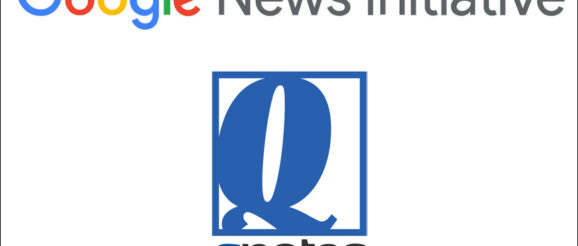QNotes Receives $130,000 in Funding from Google GNI Innovation Challenge – QNotes

Many LGBTQ publications have disappeared in the last 20 years due to increasing overhead and decreasing advertising revenue. There is a need in the LGBTQ community for an outlet to talk about more experiences that cross the lines of sex, race, gender, nationality and economic identities, and like early queer publications did, reflect the diversity and urgent needs of marginalized communities.
For over 34 years, qnotes has provided affirming images and stories about LGBTQ people in Charlotte and throughout the Carolinas. It has connected the LGBTQ community to news stories that did not often get covered in mainstream press. Despite the difficult economic years and periods of extreme prejudice, the publication has continued to operate, often with no full-time staff to represent the population it serves.
Today’s LGBTQ communities in North and South Carolina need a news outlet that celebrates their unique and diverse voices and lived experiences.
In 2021, qnotes will launch qnotescarolinas.org as a new online platform to engage and involve the community in sharing those stories throughout the Carolinas. It will start with a news platform that is fed by current freelance reporters and the part-time staff of qnotes. It will include the development of volunteer community editorial committees to help guide decisions on topics and identify underserved reporting needs in the community.
Funding from the Google GNI Innovation Challenge will allow the organization to build out this new website and offer storytelling and community reporting workshops. It will also cover engineering and software costs associated with building out interactive portals where readers and journalists can take part in meaningful conversations through community forums, as well as supporting each other.
The project starts with pilot programs in the Charlotte region and Central North Carolina. That model will allow for future expansion across the Carolinas.
The Google News Initiative’s North American Innovation Challenge received 215 applications from the U.S. and Canada. “It is especially important this year to tackle innovative ideas, and the 33 projects we’re funding look at diversity, equity and inclusion through many different lenses, all focused around the communities they serve,” said LaToya Drake, head of media representation at Google News Initiative, in a blogpost on Dec. 15.
Community Voices & Recorded History
Early LGBTQ press started because of a need to inform, educate and create visibility of queer people and the early Gay Rights Movement. Publications like ONE and The Ladder were the first nationally-distributed publications and were created by volunteer staff and mailed in brown paper to provide a level of necessary discretion to the reader. “In the early years, those publications addressed the growing fight against discrimination and abuse while providing an outlet for people to share their lived experiences, poetry and often private thoughts and feelings,” says Chris Rudisill, who will serve as the project manager for qnotescarolinas.org.
The Advocate would follow in the 1960s, inspired by a growing number of police raids on queer establishments leading up to the Stonewall Uprising. In the 1980s, they gave visibility to HIV/AIDS, a virus that was ravaging the community. Later that decade, publications like BLK: The National Black Lesbian and Gay Newsmagazine filled an unmet need for Black LGBTQ voices. “These early publications reflected the diversity and urgent needs of the LGBTQ community,” says Rudisill. “Despite the economic toil that has caused many to fold over the past decade, a select number of LGBTQ newspapers and magazines have held on providing a voice to communities that remain underrepresented in traditional media.”
qnotes has been serving the LGBTQ community of North and South Carolina since 1983 when it launched as a community newsletter. “We realize it is time for our publication to evolve,” says Jim Yarbrough, publisher of qnotes. “Similar to the 1960s, 1970s and 1980s, there is a growing need in the LGBTQ community to ensure that our voices are heard and that our experiences are not pushed back into the closet.”
The project will provide a new connection for the LGBTQ community, empower people to share their lived experiences, bring to light new and upcoming journalists in the South and better connect communities to the news they need and deserve. The project will also seek to amplify the voices of BIPOC (Black, Indigenous, People of Color) journalists and the stories of rural families.
The long-term goal will be to create a news and storytelling opportunity in communities across North and South Carolina with a sliding scale membership that allows sustainability and financial support of LGBTQ journalists, while encouraging open forums that give voice to people across the two states.
“The project focuses on the same desire and need that we had at our founding — to show that local journalism can shape lives, connect communities and create positive change,” says Yarbrough.
The team will have to raise additional funds for the qnotescarolinas.org project to support freelance journalists and a full-time online editor. Contact Jim Yarbrough to learn more or click here to donate directly to support this effort.
About qnotescarolinas.org
Launching in 2021, qnotescarolinas.org is a new online platform sharing the unique and diverse stories and lived experiences of LGBTQ Carolinians while amplifying their often underrepresented struggles. The platform will provide a community-sourced and involved hyper-local news organization that includes the voices of BIPOC journalists and the stories of rural families; will reach people where they are, despite socio-economic barriers that prevent them from getting news that matters; and will serve as a recorded history of LGBTQ people living in the South. Starting in the Charlotte and Central North Carolina regions, the model will allow for future expansion across the Carolinas.
Your email address will not be published. Required fields are marked *
